Crane Tower Search Result
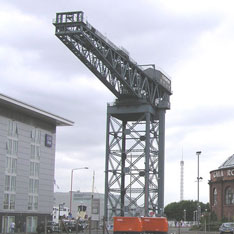
Hammerhead crane
The "hammerhead", or giant cantilever, Crane is a fixed-jib crane consisting of a steel-braced tower on which revolves a large, horizontal, double cantilever; the forward part of this cantilever or jib carries the lifting trolley, the jib is extended backwards in order to form a support for
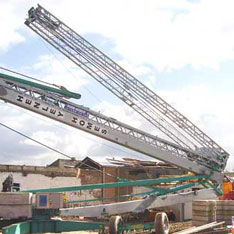
Self-erecting crane
Self-erecting Cranes, generally a type of tower crane, also called self-assembling or "Kangaroo" cranes, lift themselves off the ground using jacks, allowing the next section of the tower to be inserted at ground level or lifted into place by the partially erected
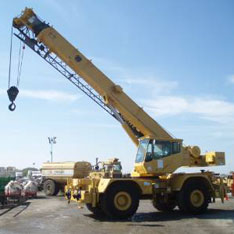
Rough terrain crane
Rough terrain Crane is a crane mounted on an undercarriage with four rubber tires that is designed for pick-and-carry operations and for off-road and "rough terrain" applications. Outriggers are used to level and stabilize the crane for hoisting. These telescopic cranes
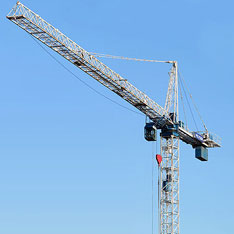
Tower crane
Tower Crane is a modern form of balance crane that consist of the same basic parts. Fixed to the ground on a concrete slab, tower cranes often give the best combination of height and lifting capacity and are used in the construction of tall buildings. The base
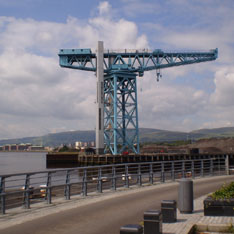
Giant Cantilever Crane
Also known as a hammerhead Crane, the giant cantilever crane is a fixed jib crane consisting of a steel braced tower, on which revolves a large horizontal double cantilever. The forward part of this cantilever or jib carries the lifting crab, and the jib is extended backwards in

Cranes
Development depends on infrastructure and infrastructure on heavy machineries. Of all the heavy machines Cranes acquire an important position as they are involved in the building and maintenance of huge projects. Crane machines are the huge tower like machineries having ropes meant to lift or to lower any heavy devices. Hence they are also referred

Tower Crane
A tower Crane is used to build very tall buildings. The crane be on the ground or on a floor in the building. As each floor is built, the crane is moved up. Tower cranes are one of the most important device that is used for the construction of huge buildings.
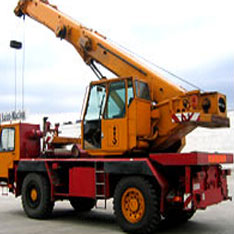
Mobile Cranes
Cranes are the huge tower like machineries having ropes meant to lift or to lower any heavy device. Cranes are not permanent structure. In fact it is a temporary structure either fixed in the ground or mounted on certain vehicles. Cranes are operated
FAQ About Crane Tower
- Types of Cranes
- New requirements about crane maintenance and competent inspecting person
- Construction and Maintenance of Cranes and Lifting Appliances
- Stability of Cranes and Lifting Appliances
- Tower Crane Superstructure
- Tower Crane Carrier
- Tower crane lifting boom
- Tower Crane Safety Devices
- YGMT Crane types
- Cranes, lifting appliances and fork lift trucks
- Crane Lifting Operations - Operators of Cranes and Certain Lifting Appliances
- Crane History
- Cranes,overhead traveling crane,Construction cranes,Tower cranes,Mobile cranes,Articulating cranes
- News conference addresses concerns over tower crane safety
- FACTORS BEHIND THE SELECTION OF CONSTRUCTION EQUIPMENTS
- Guy Derrick
- Jacking Towers
- Mobile Cranes
- Mobile Crane Tower Attachments
- Cableways
- Tower-mounted crane
- CABLE CRANES
- Limiting Tower Crane Operator Fatigue
- Tower Crane
- Luffing Tower Crane
- Topless Tower Crane
- Self-Raising Tower Crane
- Topless Tower Crane For Sale
- Tower cranes
- Crane Gantry
- Tower Crane For Sale
- Construction Machinery Types and Applications
- Question About Tower Crane - 1
- Question About Tower Crane - 3
- Oregon OSHA’s new crane standard for the construction industry
- BossBuyer Jib Cranes
- Bottom-Slewing Tower Cranes Structure and Configuration
- Wind and Tower Cranes
Cranes - these are lifting devices designed to raise materials by means of rope operation and move the load horizontally within the limitations of any particular machine. The range of cranes available is very wide and therefore choice must be based
What changes have been made affecting Crane maintenance and inspection? Owners of mobile and tower cranes must now declare on plant registration application and renewal forms that their cranes have been effectively maintained and inspected by a competent person. What are the new
Construction and Maintenance of Cranes and Lifting Appliances Cranes and lifting appliances must be of good construction and be properly assembled. This means that they must be of good design which includes, amongst other things, being well built for the purpose
Where a Crane or a lifting appliance is to be used on a slope or on uneven or soft ground, precautions must be taken to prevent overturning. This can be done, for example, by reducing the slope, levelling the ground or by using suitable supports.
rated output power 200kW, rated speed 1800 rpm., max. out torque 1100N.m, emission in compliance with European Construction Machinery Stage II. Control System Intelligent computer integrated program control system Is the key technology of the Crane. PLC program controller is used, with combination of conventional electrics, to realize the function of logic control and electronic proportional control of the system, greatly improving safety, reliability and efficiency for crane operation.
Tower Crane carrier comprises car-body, crawler track, and travel gear. Car-body and crawler track is inserted for connection, crawler track extension and retraction is driven by hydraulic cylinder. When transporting, crawler track needs not be removed,
Tower Crane lifting boom comprises main boom and fixed jib, the structural type is lattice structure of four tubular chords with intermediate equal section and two end variable section, main boom chord and web rod are made of domestic high quality tube,
Tower Crane safety devices comprise: load moment limiter, turntable lock pin, boom backstop, hoist limit switch, anemometer, level gauge, hydraulic overflow valve, counterbalance valve, two-way hydraulic lock, stewing warning lamp and travel warning lamp,
Crane is one of the key products of YGMT. Its marketing shares, including metallurgical crane, charging crane, slab tong crane, magnet crane; hydropower station bridge/gantry crane, common bridge/gantry crane, forging crane, quenching crane, load and
The Regulations apply to Cranes and lifting appliances used in the manner described in Regulation 2. The terms "cranes" and "lifting appliances" are defined legally in Regulation 1 which deals with the interpretation of various expressions used in the Regulations. "Crane"
A certificate of competence must exist for every operator of a Crane, excavator, fork lift truck, mechanical grab, mechanical shovel and piling machine. The certificate must be issued by The employer of the operator; or The owner of the equipment which the operator is using An operator who has
A Crane is a machine that is capable of raising and lowering heavy objects and moving them horizontally. Cranes are distinguished from hoists, which can lift objects but that cannot move them sideways. Cranes are also distinguished from conveyors,
Very few machines exist in as wide a variety of designs as Cranes. Before the crane is constructed, the manufacturer must consider the site where it will be used and the weight it will need to lift. In addition, cranes are often modified to suit the needs of the user. For these reasons, it is not much of
In the wake of multiple tower Crane accidents within the last year, a news conference dedicated to concerns about the overall safety of tower cranes was held in Washington, D.C. The Specialized Carriers & Rigging Association’s executive vice president
have worked to develop a method to assist in equipment selection and, consequently, different models have evolved over the years. For example, there are optimization model, graphics model and database-centred models to select tower Cranes. Different expert systems have also been developed to assist in equipment selection. Finally. there are artificial intelligence-based models. Harris and McCaffer (2001) have developed their equipment selection model based on multi-attribute
Guy derricks at one time were the only practical means to erect steelwork on high-rise structures, but that work is mostly done now with tower Cranes. Guy derricks may also be used for general rigging, stone quarrying, and construction of refineries and chemical plants. A guy derrick can be described as a Chicago boom with its own integral column, called a mast, held vertical by six or
Jacking towers are used primarily for vertical movement of large loads in tight quarters or out-of-the-way locations where a large Crane may not be suitable. There are two well-established types: those which push the loads up can be called push-jack systems, and others which pull from above are strand jack systems. A typical jacking tower is a frame supported on a foundation and
There was a time when mobile Cranes were identified with the United States and taker cranes with Europe, but the globalized modern market for all cranes now transcends regions and borders, blurring these differences. The original author of this book liked to recall a yam told
Some older mobile Crane models can be equipped with an optional front-end attachment composed of a fixed vertical tower pinned at the position on the superstructure where a boom is ordinarily mounted. A luffing boom is affixed at the tower top, and ajib is sometimes
great. As a result of these drawbacks and the availability of alternatives, cableway applications are limited to a very few circumstances typically involving long-term lift work over a chasm or to a remote location. A helicopter, tower Crane, or other work method is likely to prove more practical in nearly all instances.
Much like a mobile Crane, a tower-mounted crane moves loads by executing three motions: the hook is raised and lowered by means of a winch and fall, carried in a circular path by the swing gear, and carried in a radial motion by either luffing the jib or rolling a
CABLE CraneS The taut-linc cableway crane consists of two towers suspended between which a track cable of the locked construction is serving as a bridge structure. A carriage with a handling attachment travels on the track cable with the aid of a haul
Operators and contractors both benefit from 72-hour seat policy When operators sit in a tower Crane cab for 16 hours a day, a lot may go through their minds—and the longer they sit there, the more distracted they may become. Combine that with the constant radio chatter and directions given by the signalperson, and operators will no doubt
[caption id="attachment_38" align="alignleft" width="360" caption="tower Crane"][/caption] Tower Crane Key Specification · Square shaped structure of steel tube · Mian color: yellow · Function: hoisting · Attached devices: generator, reducer, driver cab, cable, counterweight · Certificates awarded:
[caption id="attachment_42" align="alignleft" width="360" caption="Luffing Tower Crane "][/caption] Luffing Tower Crane with Maximum Load of 16t and Working Radius Ranging from 15 to 60m Luffing Tower Crane Key Specifications/Special Features: Maximum Load: 16 T Maximum working range: 60 m Tip load: 2.9 T Working
The mechanisms of topless tower Crane adopt domestic famous factory products, reliable performance, good governing performance and shocklessness [caption id="attachment_47" align="alignleft" width="360" caption="topless tower crane"][/caption] Topless Tower Crane Key Specifications/Special
Self-raising tower Crane QTZ, which is a new-style elevating machinery specially designed for the construction of tall buildings and equipment installation, is a type of self-raising multi-purpose tower crane equipped with level arm support, and it allows trolley derricking
Specifications/Special Features: · Max load 17t (17m) · Jib length 75m · Free standing height 60m · Mast section 2*2*3m · Tip load 2.6t (75m) Advantages: · The section of the jib is much larger than the standard topkit tower Crane, hence the jib is more studier. · When there is need to place many cranes in one area, with over lapping jib, height of the 2nd crane required will only be 1-2Mtrs higher than the first crane. In normal cranes, this height needs to be minimum
[caption id="attachment_234" align="alignleft" width="241" caption="Tower Crane"][/caption] Over-long boom of tower crane is (50/55m),wide range of coverage. Heavy in section of mast section(1600*1600 or 1800*1800), good steel performance,complete tower crane is stable and little swing as load.Main material of crane
A Crane, which is equipped with a derrick or tower, is used to lower and lift materials with the use of pulleys and cable. Heavy equipment manufacturers and the construction industry use cranes in various activities connected with their process. Cranes
hoisting · Attached devices: generator, reducer, driver cab, cable, counterweight · Certificates awarded: CQM, CE, TS, ISO9001:2000 · A-grade 315TM Certificate for producing, installation, rectification, and maintenance of tower Crane issued by General National Quality Inspection Bureau · Safety system: installation of jib, balance arm, and rotary tower are in side-plate pin bracket method · Advanced technology of the TOSHIBA Japan inverter has bee adopted for hoisting
project construction. It is widely used in construction, water conservancy, electric power, roads, mines, ports and national defense sectors etc. Generally speaking, all earthwork construction projects, road construction and maintenance, mobile Crane loading and unloading operations and a variety of construction required for the comprehensive mechanization of the construction works, known as construction machinery. It is mainly used for national defense construction, transportation construction,
you check your tower locking nuts and pins? A. Daily B. Weekly C. Monthly When climbing a ladder what safety position should you hold? A. Centre rung of ladder B. Outside rail of ladder C. Does not matter where you hold on to If your Crane is fitted with a lift, how often should it be checked and tested by a competent person? A. Six months B. Weekly C. Yearly Tower cranes must be load tested in accordance with BS7121. How often should this be done? A. 6 years B. 4 yearly,
When travelling on a rail-mounted machine; how would you position your working jib? A. Jib side ways over track way B. Travel in reverse C. Jib over track facing direction of travel What would stop your Crane from running off the end of a track? A. Limit switch B. End of track safeguard C. Sand bags When should your Trolley ropes be tensioned? A. Yearly B. Weekly C. As per operators manual Where would the operator position the trolley to
Who’s affected – and when? Oregon OSHA’s new Crane standard for the construction industry – Cranes and derricks in construction – applies to all employers who are engaged in construction work and use cranes or derricks for construction. The standard takes effect Feb. 9, 2011. What equipment
Jib Crane Definition: A cantilevered boom or horizontal beam arm with bearings, hoist and trolley. This lifting machine may pick up loads in all or part of a circle around the column to which it is attached. Jib cranes can be sturdy enough to lift a
The main parts of a typical bottom-slowing tower Crane include: Undercarriage. Unlike top-slowing cranes, which are often configured without an undercarriage, bottom-slowing cranes would always have an undercarriage to connect between the ground or any other supporting surface and the slewing crane.
Like most mobile rigs, self-erecting Cranes can fold up on short notice. All other tower cranes must ride out severe storms. That requirement has induced engineers to identify two principal classes of load combinations germane to the design of these machines: hi-service loads act on the
Relative Searches
Crane Tower, Crane Switch, Crane Structure, Crane Small, Crane Service, Crane Tower, Crane Tractor, Crane Wheel, Crane With Trolley, Crawler Crane,

Email: sales@bossbuyer.com
Skype: bossbuyer
Market Hotline
0086-21-61435-919
Service Hotline:
0086-21-61435-919
